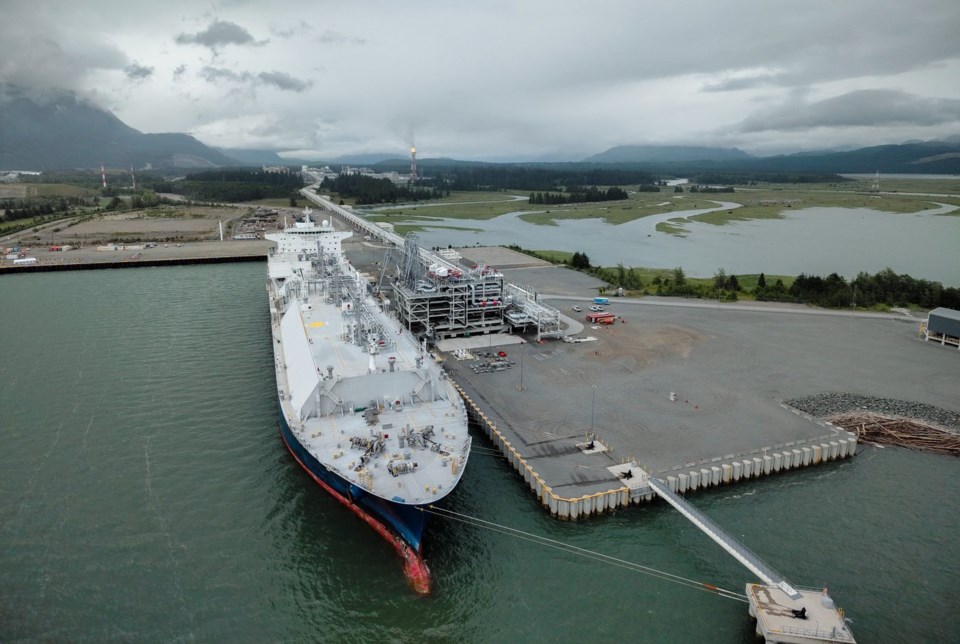KITIMAT — A tanker carrying the first liquefied natural gas to leave Canadian shores is sailing across the Pacific, a major milestone as the country looks to diversify its export markets for oil and gas beyond the United States.
LNG Canada said Monday that the vessel GasLog Glasgow has departed the northern port of Kitimat, B.C., full of ultra-chilled natural gas.
CEO Chris Cooper called it a "truly historic moment."
LNG Canada hasn’t confirmed the overall price tag for the project. But the federal government has billed it as the biggest private sector investment in Canadian history – $40 billion between the Kitimat operation, the northeast B.C. gas fields supplying it and the pipeline in between.
It’s a joint venture between Shell and Malaysia’s Petronas, PetroChina, Japan's Mitsubishi Corp. and South Korea's KOGAS.
“Canada has what the world needs," Prime Minister Mark Carney said in a news release.
"With LNG Canada’s first shipment to Asia, Canada is exporting its energy to reliable partners, diversifying trade and reducing global emissions — all in partnership with Indigenous Peoples."
Over the span of construction, LNG Canada says 50,000 Canadians have directly contributed to building the facility at one time or another, while another 25,000 worked on TC Energy's Coastal GasLink pipeline.
More than 300 full-time, permanent jobs have been created and $5.8 billion in contracts and subcontracts have been awarded, mostly to Indigenous-owned and local businesses, LNG Canada said.
The project's first phase aims to export 14 million tonnes of LNG per year, which could be doubled with a second phase.
Cooper said there will be a lot to contemplate in a final investment decision on Phase 2.
“We need to bring together things like competitiveness, affordability, GHG policy, just to make sure all those pieces fit,” he said in an interview.
Liquefied natural gas, or LNG, is gas that has been chilled at temperatures of -162 C into a liquid state, enabling it to be transported overseas in specialized tankers.
Until now, Canada's only export market for its gas has been the United States, via pipeline. The trade relationship between the two countries has been rattled by U.S. President Donald Trump's evolving tariffs and musings about annexing Canada. Advocates say securing new buyers would reduce Canada's reliance on the United States.
The startup also comes against the backdrop of Mideast turbulence that has raised the spectre of global oil and gas supply disruptions.
“As world events continue to demonstrate, a reliable supply of responsibly produced energy can never be taken for granted,” said Cooper.
British Columbia Premier David Eby said it's more important than ever to reduce Canada's reliance on the United States.
“With abundant resources the world needs and a strategic location to deliver them, shovel-ready projects like this are how B.C. will become the engine of a newly revitalized, more independent, and growing Canada," he said in a news release.
The chief executive of TC Energy, the company that built the pipeline feeding gas to the Kitimat plant, said Canada and the U.S. were together at the starting line of the LNG race 15 years ago.
"While the U.S. has successfully become the largest LNG exporter in the world, today Canada enters the global market — putting the country on the path to becoming an energy superpower and supporting North American energy security," said François Poirier.
Other LNG projects under construction include Cedar LNG, a joint-venture between Pembina Pipeline and the Haisla Nation and the Woodfibre LNG project near Squamish, B.C. A final investment decision has yet to be made on the Ksi Lisims facility north of Prince Rupert, B.C., a partnership between Nisga'a Nation, Rockies LNG and Western LNG.
Cooper said Kitimat residents may continue to see occasional flaring as the plant stabilizes, and they’ll soon see more ships docking in the harbour.
“Once we get into stability, we’ll probably have a ship every other day or so,” he said.
Kitimat Mayor Phil Germuth said in a community well accustomed to industrial development, most residents have been understanding of the flaring they've seen during the plant's commissioning.
"We've got to put up with a little bit of an inconvenience," he said. "To get that multi-decade benefit for the community, we're willing to put up with that."
At some points during construction, 7,000 workers flocked to the community with a population of under 9,000. But Germuth said there were few problems.
"LNG Canada put an extreme amount of effort and resources into making sure, even years before (its final investment decision), that the negative impacts on the community would be as small as possible."
LNG has been touted as a “bridge” or “transition” fuel to supplant coal as a power source in emerging economies, but environmental groups have said those green labels don't hold when the overall emissions of producing, liquefying and shipping the gas is accounted for.
Anna Barford, oceans campaigner at Stand.Earth, argues that it requires so much new infrastructure that it can’t be considered a stop-gap solution.
“This is a lifeline for the fossil fuel industry when we really need to be moving into renewables and into future-safe energy and services.”
She added the fuel cannot be considered green when methane -- a key component of natural gas with climate-warming impacts far exceeding carbon dioxide -- is able to escape into the atmosphere from pipes, tanks and vessels throughout the LNG supply chain.
This report by The Canadian Press was first published June 30, 2025.
Lauren Krugel, The Canadian Press



